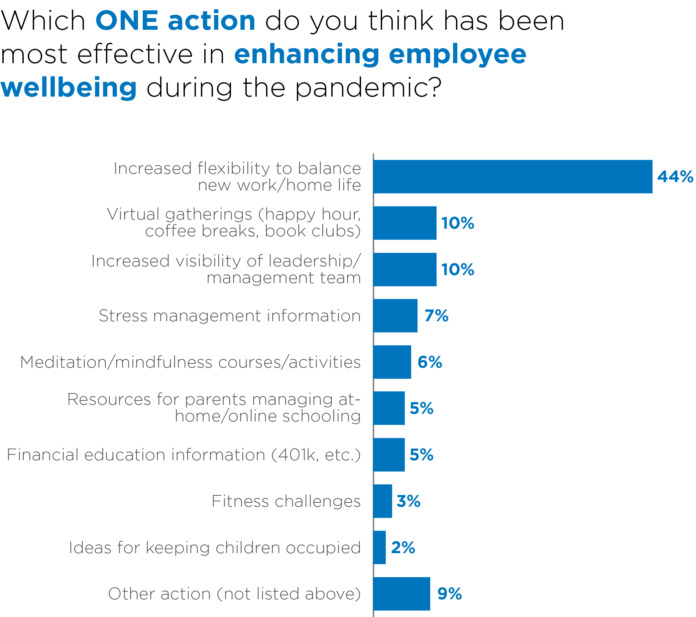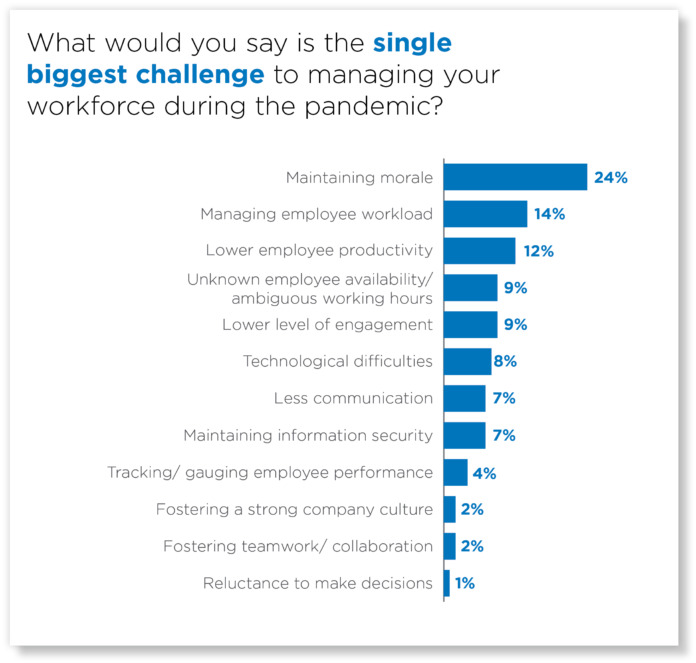Brief • 4 min Read

This data reflects insights gathered from a series of research studies focused on how SMB owners are faring during the COVID pandemic. The Harris Poll teamed with TriNet, a comprehensive HR Solutions provider for SMBs. These initiatives focus on the state of SMB beyond TriNet’s own customer base and provides an insightful narrative as to how SMBs have coped and adapted during these challenging months.
According to the survey results, the majority of SMBs (58%) were investing in the health of their workforce by adjusting healthcare benefits or offering guidance to employees. Further, 92% have made efforts to shift to a remote workforce as a result of the COVID-19 pandemic. Eighty-two percent of SMBs have taken actions to enhance employee wellbeing, with the most common and effective of these actions allowing for the flexibility to balance the new work/home life conditions. And, lastly, the majority of SMBs (71%) have made HR changes, or plan to make them, as a result of the pandemic.
Amber Broughton, managing director of The Harris Poll noted, “small and medium size businesses continue to step up as they adapt to the new realities of this pandemic, investing in the wellbeing of their workforce through enabling remote work, staying in close contact, and offering increased flexibility to balance daily work and life.”
Supporting Employee Wellbeing
The current state of the remote workforce has made 82% of SMBs take concrete actions to enhance employee wellbeing. According to survey respondents, the single action they feel that’s been most effective in enhancing employee wellbeing include:

Overall, 74% of SMBs say that most or all of their employees have taken advantage of the new employee wellbeing offerings. In fact, 57% of SMB leaders say their workforce remains optimistic in light of the current circumstances, with 52% believing their optimism is trending upwards since the start of April.
Employee Health Coverage
Highlights from The Harris Poll survey show that SMBs have invested more in their employees’ health and safety.
- Nearly 58% of polled companies have adjusted healthcare benefits or are offering guidance to employees
- 39% have changed their healthcare benefits to respond to the pandemic, such as extending healthcare coverage to laid off employees
- 53% are offering at least some form of guidance in areas like the Affordable Care Act, COBRA, short-term medical, and telemedicine, for employees that are losing healthcare coverage
When it comes to short-term healthcare coverage, SMB leaders are primarily concerned about the cost to the employee, with 22% citing this as the single most important consideration.
Enabling Remote Work
While the COVID-19 pandemic has posed many challenges for SMBs, 75% of SMBs who have made efforts to shift to a remote workforce said it has been challenging. Sixty-five percent of SMB leaders for whom remote working is a possibility said they wished they had implemented a remote workforce earlier.
Productivity among employees able to work from home has shifted. According to a survey fielded April 16 – 20, the majority of SMB leaders (62%) indicated a downtick in productivity. However, when identifying the single biggest challenge in workforce management during the pandemic, lower employee productivity ranked third on the list SMBs (12% selected it as the single biggest challenge). As of May 5 – 8, employers indicated that 55% of employees were less productive – with 45% indicating that employees were more productive.
Maintaining morale is the single biggest challenge SMB leaders face when it comes to managing their workforce. Other aspects SMB leaders picked as their single biggest challenge include:

The current state of the remote workplace has SMB leaders planning for the future once the pandemic subsides. Fifteen percent of SMBs expect that all of their employees will remain working remotely, 52% of those for whom remote working is a possibility expect that some will remain remote, and 33% say none of their employees will stay working remotely when the crisis is over.
Methodology
For this research, TriNet teamed with The Harris Poll to conduct a series of ten online surveys from April 3 to May 8 among small business leaders in U.S. companies with 5 to 249 employees. Between 150-200 responses were collected for each of the ten waves. Business leaders were qualified as either owners/partners or C-level executives.
Subscribe for more Insights
Subscribe to our newsletter for the latest trends in business, politics, culture, and more.
Related Content









